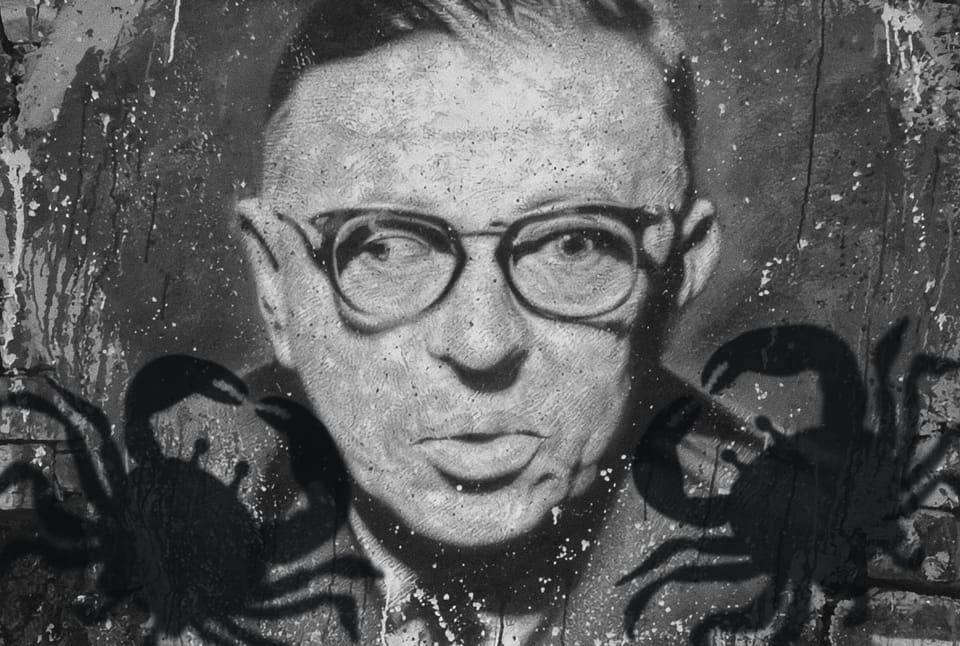When Mescaline Led a Philosopher to Hallucinate Crabs

Frequently touted as a heart opener, most Mescaline experiences tend to be positive.
But what's the fun in reading about just positive experiences?
That's too boring.
So today, we're going to look at a wacky, old-school encounter involving crabs... not the sexually transmitted kind, but the imaginary kind you may see when you're too high on Mescaline 🤭
As you may know...
Mescaline is a substituted phenethylamine derivative that occurs naturally in certain cacti like Peyote and San Pedro.
One notable effect of phenethylamines like Mescaline and 2C-B is a heightened sensitivity to physical awareness.
They tend to add a dimension of subtle texture to the experience, which you can literally feel due to the enhanced tactile sensations.
First, let's rewind back to 1918 for a second.
Once upon a time, a German chemist and psychedelics pioneer Ernst Späth isolated and purified Mescaline from the Peyote cactus 🌵
...and a year later, in 1919, Ernst became the first person to accomplish a complete synthesis of the compound as well.
Fast-forward to 1935, and 30-year-old Jean-Paul Sartre, the French existential philosopher, is wildin' out getting Mescaline injections by his homie (and psychiatrist) Daniel Lagache at Sainte-Anne Hospital in Paris.
As a philosopher, Sartre held the belief that Mescaline had the potential to aid in his research in phenomenology and enable him to perceive the world differently.
Little did he know that Mescaline would eventually lead him to a nervous breakdown.

In 1971, a conversation between French philosopher Jean-Paul Sartre and John Gerassi, a political science professor at Queens College in New York, was documented in the book "Talking With Sartre: Conversations and Debates."
In this conversation, Sartre recounted his Mescaline experience from 1929.
The following is an excerpt from that conversation:
Sartre: I ended up having a nervous breakdown.
Gerassi: You mean the crabs?
Sartre: Yeah, after I took mescaline, I started seeing crabs around me all the time. They followed me in the streets, into class. I got used to them. I would wake up in the morning and say, “Good morning, my little ones, how did you sleep?”
I would talk to them all the time.
I would say, “O.K., guys, we’re going into class now, so we have to be still and quiet,” and they would be there, around my desk, absolutely still, until the bell rang.
Gerassi: A lot of them?
Sartre: Actually, no, just three or four.

Grassi: But you knew they were imaginary?
Sartre: Oh, yes. But after I finished school, I began to think I was going crazy, so I went to see a shrink, a young guy then with whom I have been good friends ever since, Jacques Lacan.
We concluded that it was fear of being alone, fear of losing the camaraderie of the group.
You know, my life changed radically from my being one of a group, which included peasants and workers, as well as bourgeois intellectuals, to it being just me and Castor.
The crabs really began when my adolescence ended.
At first, I avoided them by writing about them — in effect, by defining life as nausea — but then as soon as I tried to objectify it, the crabs appeared.
And then they appeared whenever I walked somewhere. Not when I was writing, just when I was going someplace.
The crabs stayed with me until the day I simply decided that they bored me and that I just wouldn’t pay attention to them. And then the war came, the stalag, the Resistance, and the big political battles after the war.
That's a hell of a trip, huh? 😅🦀
It is interesting to note that the crabs disappeared as soon as Sartre decided that he was bored and refused to pay attention to them.
In a way, the crab, representing fear(s), could also be looked at as one of his internal demons.
As mentioned in How to tame your inner demons, the demon disappears as soon as you surrender to it.
You see...
The crabs represent the human condition
The crustacean symbolized the existential struggle of humans: a solid, rational exterior hiding an irrational, amorphous interior.
We appear rigid and solid on the outside, but we are actually chaotic and gooey on the inside.
This duality mirrored Sartre's belief that people strive to appear coherent and in control while dealing with life's inherent ambiguities.
Like a crustacean's hard shell concealing its messy insides, we build facades of stability, only to face the fluid complexities within.
Just as the crab’s shell provides protection and structure, we too often cling to our familiar habits, routines, and self-image, feeling secure in our established identity.
However, just as the crab must shed its shell to accommodate growth and evolution, so too, must we be willing to release our attachment to who we think we are and allow ourselves to adapt and transform...
The process of shedding and regeneration is crucial for spiritual development and for thriving in a constantly evolving world.
By embracing flexibility and openness, we can tap into the boundless potential within us, much like the crab’s ability to molt and emerge anew.
What are you currently shedding to make space for the next stage of growth?
Have a lovely day!
Your friend,
—Dr. D
🧙🏽♂️❤️🧞♂️



⭐ = Mustafa's favorites
📺 Video: In a twist of fate and irony, traumatized U.K. police officers are using psychedelics to heal from their own trauma. Hopefully, this opens the door for a more compassionate approach towards citizens who use psychedelics as well. After all, cops using psychedelics to improve their policing is a comical case in favor of decriminalization 😅 via YouTube [6:01] ⭐
🔬 Study: Is MDMA Neurotoxic? And if so, what does that mean? Well-balanced article on the myths and facts surround MDMA neurotoxicity via DanceSafe
🔊 Podcast: The future of psychedelic science, UC Berkeley professors discussing the evolutionary origins, brain impact, and therapeutic potential of psychedelics, and also highlighting the importance of extending therapy beyond the psychedelic experience, since the brain remains highly receptive for weeks via Berkeley [1:02:00]
🔊 Podcast: Luminous, A Series About Psychedelics from 'To The Best Of Our Knowledge: Excellent podcast series by Steve Paulson that explores the philosophical and cultural implications of psychedelics through conversations with scientists, healers and religious scholars via NPR ⭐
📰 Article: The State of Psychedelics, could these mind-altering substances be the cure for the mental health crisis? We unpack the science, the path to acceptance, and the stunning potential via Oprah Daily
📰 Article: Allegations of MDMA Research Misconduct Threaten FDA Verdict: The FDA is set to decide on approving MDMA for PTSD treatment, which would be an incredible milestone for psychedelic therapy. But, now, there are allegations of research misconduct and ethical violations that have cast doubt on the data's validity. A public advisory meeting is scheduled for June 4 to address these concerns, with the FDA's decision expected by early August. Here's a response to the allegations as well via NPR / Psychedelic Alpha ⭐
📗 Book: There's a new book out called Trippy: The Peril and Promise of Medicinal Psychedelics by a New York Times reporter named Ernesto Londoño. If you'd like to preview the contents of the book and hear Londoño's personal mental health experiences and his belief in the therapeutic promise of psychedelics, take a listen to this podcast with Audie Cornish via Amazon / YouTube ⭐
📺 Video: David Olson, director of the UC Davis Institute for Psychedelics and Neurotherapeutics and an associate professor of chemistry, biochemistry and molecular medicine, shares how psychedelics induce neuroplasticity and why it is relevant to treat various brain conditions. He also discusses the institute's efforts to develop compounds that are chemically similar to psychedelics and are safe, effective and more scalable via YouTube [55:43]
📰 Article: Psychedelic-assisted therapy is going mainstream, but how will the industry grow around it? Despite regulatory, insurance, and cultural challenges, integration of psychedelics into the medical system is advancing with institutions like Johns Hopkins and legal frameworks in Oregon. Issues like therapist training, economic feasibility, and acceptance hinder growth and advocates are promoting group therapy and community programs to increase accessibility, especially for marginalized populations via KellogInsight
📰 Article: Meditators in the Bay Area are rediscovering ancient jhanas, which promise to revolutionize our understanding of the brain and transform lives. By inducing altered states of consciousness, practitioners claim intense pleasure and happiness rivaling psychedelic substances like MDMA and psilocybin. One practitioner describes achieving a state of flow-like focus and intense bliss, calling it a “taste of happiness” that could help those struggling with addictive habits via AsteriskMag
📰 Article: What a Terror Attack in Israel Might Reveal About Psychedelics and Trauma - Imagine being high on LSD when rockets aimed at killing you are raining all around you. This is an interesting case study of the effects of psychedelics on the participants of the Nova Festival in Israel during the Hamas attack via The New York Times (🔓 non-paywall)
📰 Article: Almost No One Is Happy With Legal Weed, Will legal psychedelics be any better? -The legalization of marijuana has been an unqualified success for no one, with many concerns remaining about its availability and regulation. In contrast, psychedelics are being pushed forward through medicalization and state-regulated industries, which may lead to inequitable access and high prices via The Atlantic (🔓 non-paywall)
📰 Article: Welcome to the Age of Psychedelic Inequality: Psychedelic-assisted therapies, though transformative, are now ironically inaccessible due to high costs. Despite research and FDA backing, affordability remains a major issue, particularly for marginalized communities. Wealthier individuals can access these treatments easily, but lack of insurance coverage worsens disparities via The Nation ⭐
🔬 Study: This study found that individuals with a history of personality disorders had a higher prevalence of negative responses to psychedelics. Since everyone is always sharing only the positive side of psychedelics, it's nice to see more studies on the negatives via SagePub
🔬 Study: This study found that MDMA helped offer some protection against developing PTSD while being under the influence of it and simultaneously experiencing trauma. Dr. D wrote a thread about the horrific event surrounding this research on Twitter/X as well via bioRxiv
💰 Business: Reunion Neuroscience, a drug company developing psychedelics for the treatment of mental health conditions, has raised over $100 million dollars to support its research efforts.
💰 Business / 🔊 Podcast: Regulatory risk in the psychedelics industry is decreasing and getting closer to commercialization. The best psychedelic(s) stocks to invest still appear to be Compass Pathways, Cybin, Mind Med, and ATAI via Seeking Alpha [13:51]



I have no routines or personal history.
One day, I found out that they were no longer necessary for me and, like drinking, I dropped them.
One must have the desire to drop them and then one must proceed harmoniously to chop them off, little by little.
If you have no personal history, no explanations are needed; nobody is angry or disillusioned with your acts.
And above all no one pins you down with their thoughts.
It is best to erase all personal history because that makes us free from the encumbering thoughts of other people.
I have, little by little, created a fog around me and my life.
And now nobody knows for sure who I am or what I do. Not even I. How can I know who I am when I am all this?
―Carlos Castaneda, Journey to Ixtlan: The Lessons of Don Juan
Member discussion